“i dream of dragons”
Hook
The human population has dwindled – only seven small villages scattered at the foot of a mountain remain, with no other civilization in sight.
People called it a plague. Punishment from a higher being, the village Elders had said. Eighty years ago, it swept through the world, silent and merciless, turning life to dust and leaving few survivors.
A curse followed shortly after: the inability to dream.
Play through the eyes of Dan-bi, a young adventurer, who leaves their village to search for the truth and an explanation behind the suffering inflicted on their people. The world is not kind, this much is known, but for reasons that may be darker – and perhaps, simpler – than previously thought.
IF Link
P4 version (refined): play on itch.io
P2 version: i dream of dragons
– – – – – – – – – – – – – – – spoilers below, read after playing – – – – – – – – – – – – – – –
Premise + Concept
This idea came about from things I’ve been thinking about a lot, especially within the past two years. During quarantine, I rediscovered my love for fantasy and fiction through video games, and got knees-deep in fandom culture, fanfiction writing, and world-building. I spent a lot of time daydreaming, which was something I found that I had not done freely since I was much younger. Subconsciously, I had internalized things that mentors, parents, and friends had either explicitly told me or implied – that daydreaming, reading fantasy/fiction, and engaging in nerdy fandom culture was “childish”, “foolish”, and “a waste of my time”.
When I do have them, my dreams and daydreams have always been (and still are) extremely vibrant, dystopian, fantastical and highly unrealistic. But as I grew older, I always attributed some form of guilt or shame to them, thinking that I was “too old” to be living in my imagination.
At some point, I had internalized other people’s negative perceptions of dreaming and imagining fictional worlds so much that there was a period of time where I stopped dreaming altogether.
I didn’t realize I was mourning this loss until I rediscovered that side of myself through video games, fantasy books, and animated films during quarantine, and I realized how foolish it was of me to lock away that part of me in the first place. So I decided to write a story about this process of growing up and losing a defining characteristic of my childhood, and the relief and beauty in its rediscovery.
Characters, Names, Terms + Explanation
I wanted to incorporate a bit of my own culture in terms of naming the characters. All character names, village names, and other game-unique terms are romanized versions of Korean words.
Though the names of the villages are not stated, each of the seven villages is named after one of the seven deadly sins.
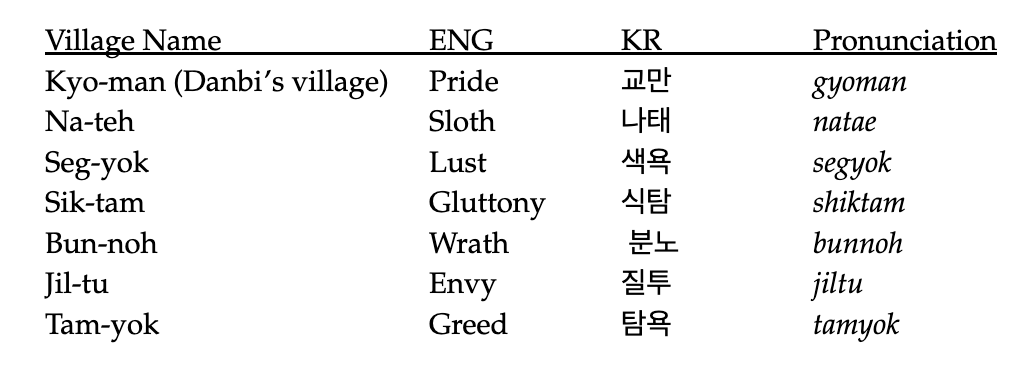
Each character’s name is significant, and the meaning of their name is intended to complement the meaning of their assigned guardian’s name.
- Dan-bi (단비, pronounced danbi)
- Role: Main character
- Meaning: long awaited rain, spring rain, timely rain
- 22 years old, gender neutral
- Ho-su (호수, pronounced hosu)
- Role: Main character’s guardian
- Meaning: lake
- Appearance: Blue-white dragon in spirit form, elderly woman as one of their human forms
- ?? years old, gender neutral
- Ja-yu (자유, pronounced jayu)
- Role: One of the San-ai living in the forest from Ch. 1
- Meaning: freedom
- Appearance: Jade green eyes
- 8-9 years old, female
- Bit-na (빛나, pronounced bitna but phonetically bichna)
- Role: Catalyst for Dan-bi’s journey from Ch. 0
- Meaning: shining
- 14 years old, female
- Yi-sul (이슬, pronounced eeseul)
- Role: One of the San-ai in Ch. 2
- Meaning: dew
- Appearance: lithe, golden-skinned young man
- 20-22 years old, male
- An-ghe (안개, pronounced angae)
- Role: Yi-sul’s guardian
- Meaning: mist, fog
- Appearance (not shown): a large phoenix-like bird
- ?? years old, gender neutral
- San-ai (산 아이, pronounced sanai)
- Term for the children who were born and raised in the mountain and whose parents left the seven villages
- Meaning: mountain child
And a rough sketch of the main character’s appearance and garments, inspired by traditional Korean clothing.
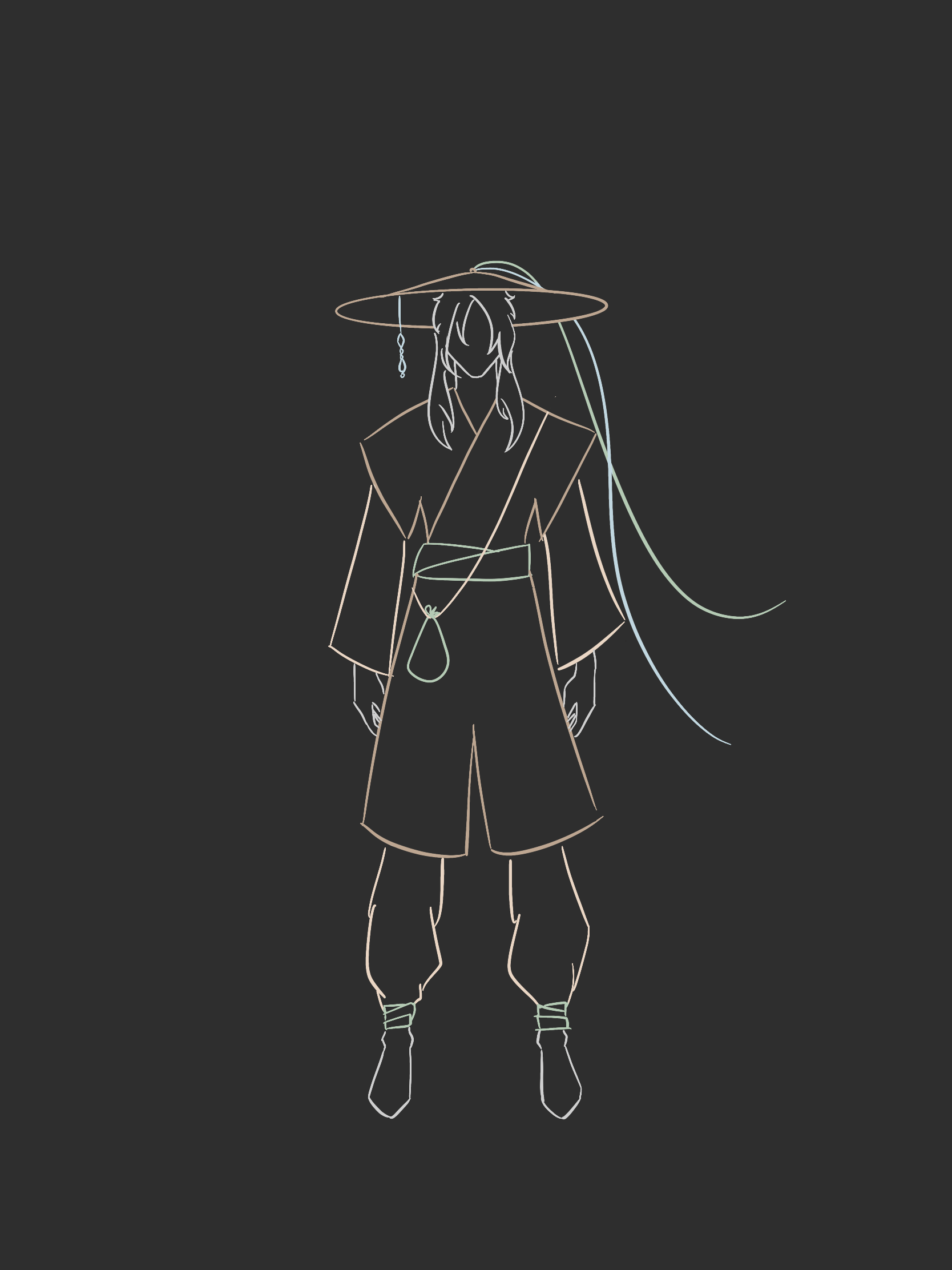
Playtest
I had a lot of difficulty doing iterations for my project since I missed a class and was very sick for a few days. I got to playtest the most during the very first few iterations of my game, but that was only when I had only a few pages on Twine that focused on building up the setting. I playtested with Miranda, Annie, Jasmine, Ember, and Alejandro (the only one I remembered to get a picture of).

The main feedback I got from these preliminary playtests was a bit of reassurance in the type of prose-like language I was using. I was worried that my longer sentences and imagery would be a hassle to read (which I think is the case now that my game is… very long) but they said that given the nature and setting of my IF, the language worked in my favor.
I didn’t get to playtest much during the middle of my process because I was sick, so I unfortunately had most of my game written out by the time I got around to playtesting again. This time, I had some friends play through my game during a study session we had at Tresidder.
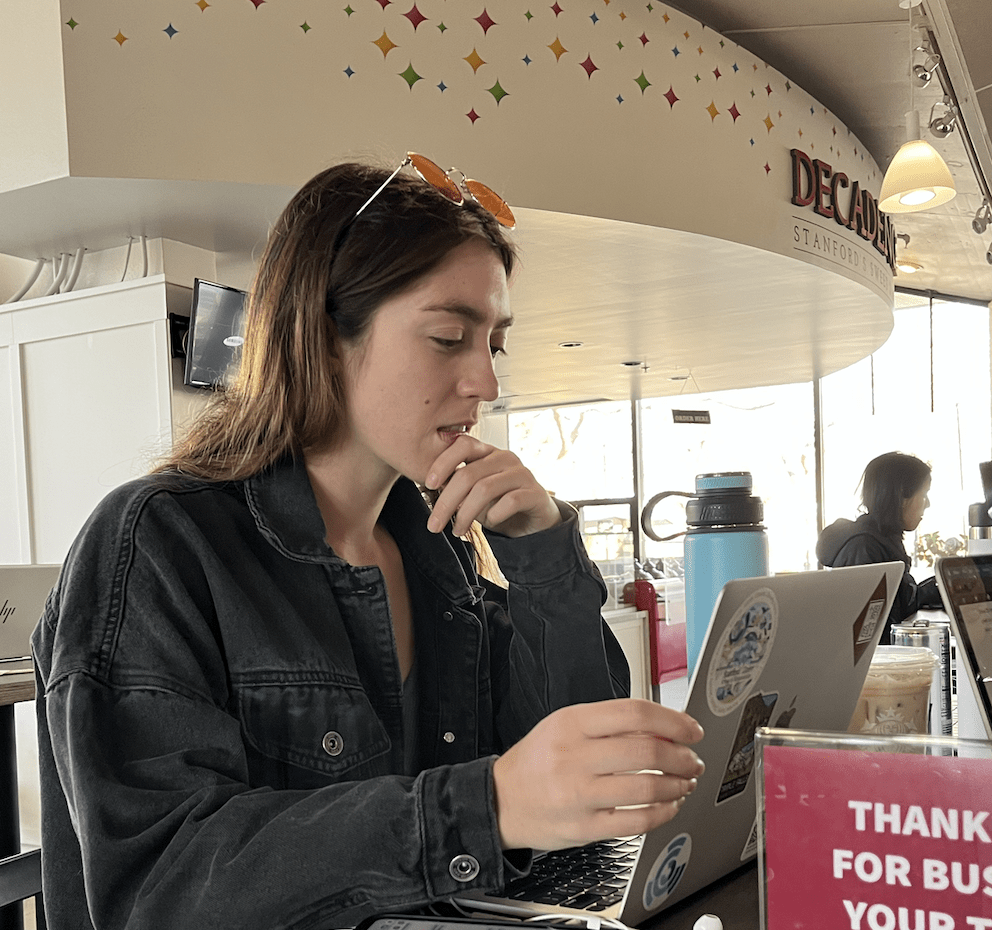
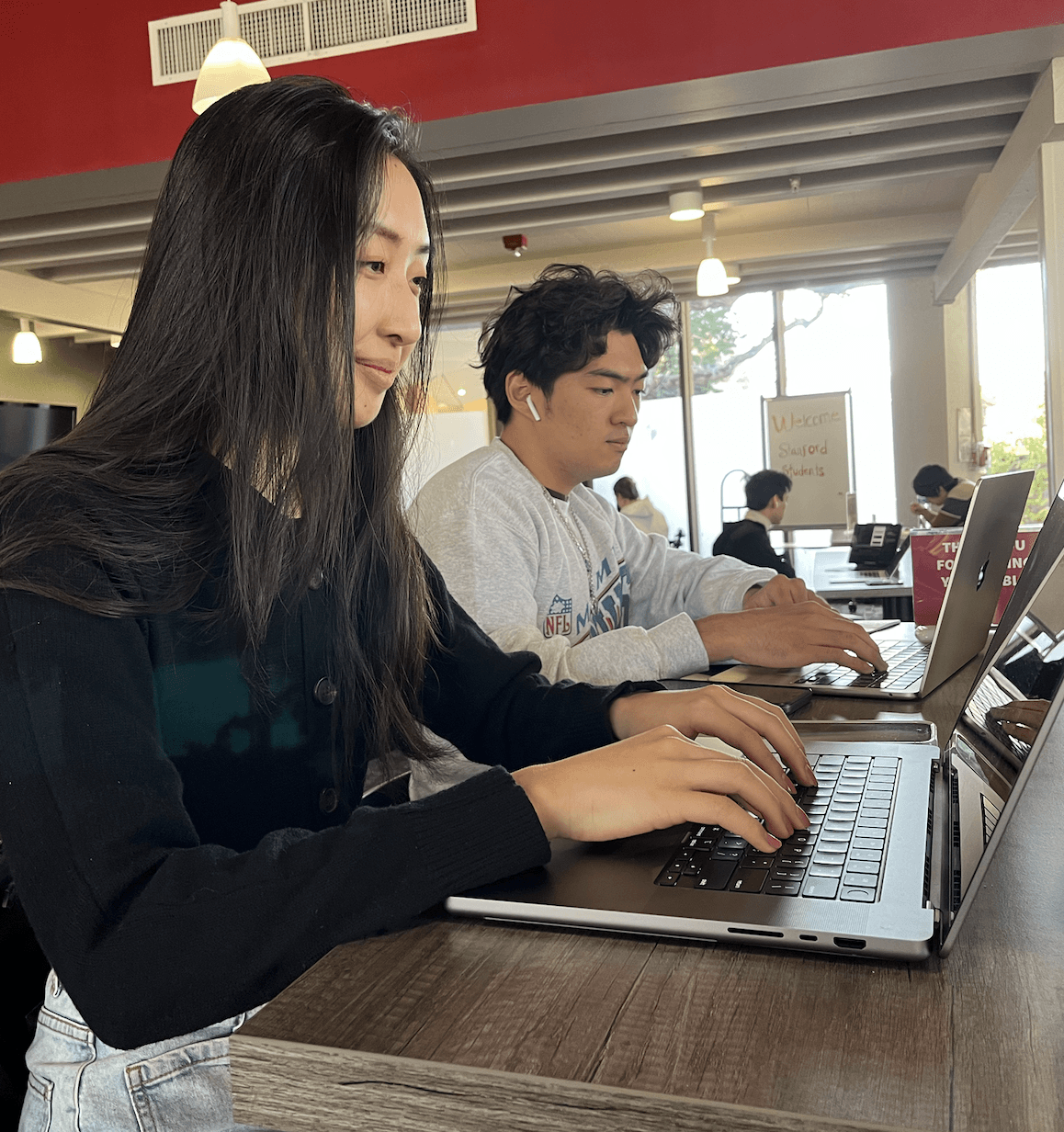
My game was long and neither of them had a lot of time, so we only got as far as testing chapters 0 through 2. Chapter 3 remains untested, which is why I feel it is a lot rougher than the rest. Some of the most valuable feedback I got are little tweaks to make monologues, thoughts, and dialogue between characters feel more natural. This is usually the most valuable feedback to me when I have beta readers for my creative writing pieces – I’m usually much more comfortable writing setting and imagery and more awkward with dialogue, and what sounds natural to me conversationally may not be the case for others. Another piece of advice was that my writing was a bit long, which I know is definitely one of my habits. As they went through the chapters and the pages, it was harder for them to read everything since the story was long. I tried my best to cut down but was a little limited on time, so I couldn’t do as intense of a cut as I think I needed.
Reflection
I had a lot of fun writing this story. It felt similar to the chaotic writing process I take when I write short stories and fanfic, but I think the most major shortcoming I had was precisely because of I approached it similarly to my previous writing experiences: I wrote a very linear storyline and did not give the player a lot of room and freedom to explore different routes in the story. I had difficulty making the shift from creating a story for a player rather than a reader, though I was aware of the differences. The main things I would do differently would be:
- Incorporate more choices for the reader (I only ever included one or two choices at a time, never more), and
- Write at least one more alternate ending to give more agency to the player and maintain integrity to the nature of an interactive fiction game
Other things I could have done better are:
- Cutting down on my writing, or at least using shorter sentences to keep the player engaged
- Starting the creation process earlier, playtesting more, and iterating through more fleshed-out versions
I needed to put in more time to unlearn some of the habits I had from previous writing experiences, learn how to approach writing for a game differently, and then execute.
Some other improvements that I think would have been nice-to-haves:
- Writing some code to have chunks of dialogue appear when the user presses a keyboard key, instead of having all the dialogue display on the screen at once
- Incorporating audio like sounds of birds, trees, and water during the scene where the main character is walking and thinking
- Incorporating audio cues that would specifically correspond to dream flashbacks or the presence of Ho-su, the main character’s guardian
- Incorporating visual elements to break up the large chunks of text


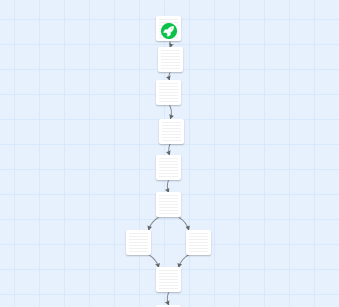
The values that I see reflected in the game are appreciation for childlike senses of wonder and creativity, and resists against the shutting-down of these things as we grow older. This was shown in the narrative itself; the people around the main character constantly tell them to stop daydreaming, spacing out, doing silly things etc; as a result, the character cannot dream anymore and is part of the Departed. This is also explicitly stated at the end of the IF.
I thought that the narrative was really well-written and had an amazing prose, and it resonated with me as well. I do feel that as I get older, alot of that child-like sense of wonder and creativity was beaten out of me, though institutions like school (CS377G is totally cool, though, it’s helping me regain it back!) and the elders around me, so I found the narrative to be relatable.
I think that the game could have done more to fit the use of the medium. It didn’t feel like my choices mattered. I think that the game did a really good job of establishing a linear narrative, but I really would have loved to see how that story could have taken place if I had a bit more freedom in my decisions in some places.
The game had some choices, but the choices seemed to only constitute specific reactions that I had to events, where I would react to something that happens, and the narrative just walks forward without caring for what it is that I did. For example, it didn’t really seem like it would have mattered that much if I decided to sit down and rest at some points of the mountain, or keep going. And when I went back to try out what happened in those options, nothing much happened.
One thing that I deeply appreciated was the narrative and the prose; the language was very colorful, and the dialogue was very well-written as well. It had a very poetic feeling to it.
One thing that I believe could have been improved on was the consequences of choices that I would have taken. What if I decided to be rude to the elder and the elder then decided to not take part in the revelation at the end? I think exploring a potential reaction from the elder that differed from what was done and other cases like this could greatly enhance the project.
Key actors and societal input are two good starting points to look at the value of this game. I think since Izzy’s cultural background as a Korean person, she’s able to construct this world in a way that has more depth from the words she chooses to use, names she gives, and lore to learn. These metaphors are symbolic in her narrative as they give me a player more to dig into. By bringing in these themes of childhood innocence and creativity, I think the game delivers a thrilling narrative that teaches us all about the wonderful things about daydreaming.
By the end of the game, I was able to grasp that the game was trying to teach the players to not grow up too fast and remember the joys of youth. In the beginning, I wasn’t as clear but I think that was supposed to be the mystery of the overall game and to build up to this final review. I really like the medium for this game as I was able to make decisions along the way–as the game was split up into chapters. However, there weren’t as many actions since a large portion of the story is narrative based so I’m wondering if there is another engine that works better for games that are heavier on the story aspect. Since there were limited choices, a lot of the decisions I had to make–on occasions that I was prompted one–I kinda chose one that I feel like I would do at the moment if I was the character in that world. However, the choices we do get to make give us insight into the protagonist’s psyche which I thought was nice since there were many internal conflicts as much as external ones.
I really appreciated the story. It was compelling, mysterious, and split up into chapters which I thought was fascinating. The way the characters were introduced and written was also fantastic as I was able to move through this world meeting distinct characters that were different from the one I was playing.
If you were trying to make this into your P4, I would suggest giving us more options to choose from with actions! I think it would be really interesting to see what else we can do to alter the hero’s journey. In addition, I’m not sure if all actions lead to the same ending, but if they do, might be fun to see if any actions chosen could lead to other possibilities.
The abstract values I saw in the game were imagination, spiritualness, and independent thinking. The game designer, Izzy, defined these values in terms of a story of an early adult getting re-connected with their childhood dreams after a spiritual adventure. She implemented these values by making an interactive fiction for this story. After reading Izzy’s write-up on how she locked her love for fantasy away because of what people around her told her and rediscovered that love during quarantine, I started to see the parallel between her own story and her character, Dan-bi’s story. I was very impressed with how she told a story of her own in a fantasy world.
The game made me think about what people told me to believe in and what I once believed in. There are so many opinions from our parents, teachers, and peers, telling us what is right and wrong in this world. We might have given up something we treasured the most just because we were told to. Maybe it is time to reconnect with what we truly love. I would say this game does make me think about my dreams. It would be great if I could learn from the consequences of my choices in the game.
This is a great story. The writing was great. However, because the choices in this game didn’t make large changes to the story, Twine’s functionality wasn’t fully utilized. I tried multiple different choices, and they just changed some descriptions of the protagonist’s actions. It would make the game even more awesome if different endings were added. I did pause and think about how to treat the old lady in Ch. 3 because I didn’t know whether this character liking me or not would change the ending.
Overall, the story was very well written, and I love at the end how the whole mystery unfolded at the end.
The game described seems to have a strong emphasis on imagination, creativity, and the importance of holding onto childlike wonder. The game’s creator, who was inspired by their own love for fantasy and fiction, chose to incorporate elements of their culture into the game by naming characters and villages after Korean words. Isabelle draws from her own experiences to create a world that is rich in metaphor and symbolism. Additionally, the characters’ names and appearances are significant and intended to complement the meanings of their assigned guardians’ names. The game explores the theme of maintaining a childlike sense of wonder and creativity in a world that tends to stifle those qualities. The protagonist’s journey is one of rediscovering the magic of imagination and fantasy that had been suppressed by societal pressures to conform and grow up too fast. The narrative is well-written, with beautiful prose and dialogue that has a poetic feeling. The game, however, could have done more to utilize the medium by providing more meaningful choices that affect the outcome of the story. While the choices given offer insight into the protagonist’s psyche, they do not have a significant impact on the story’s progression, and the limited choices provided may leave players wanting more agency in shaping the story’s outcome.